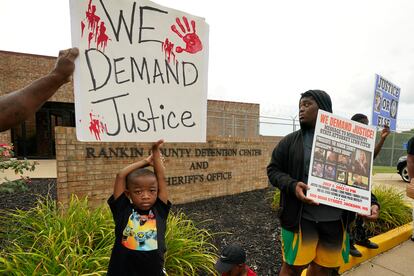Justice Department opens probe of police in small Mississippi city over alleged civil rights abuses
The lawsuit claimed officers targeted Black drivers with illegal roadblocks, retaliated against people for recording police activity, committed sexual assault and made arrests of people for using profanity

The U.S. Justice Department launched an investigation Wednesday into alleged civil rights violations by police in a majority Black Mississippi city, stepping in following accusations that officers used excessive force and arrested people without justification.
The federal probe will focus on numerous reports from residents of Lexington, a city of about 1,600 people some 65 miles (100 kilometers) north of the capital of Jackson. The lawsuit claimed officers targeted Black drivers with illegal roadblocks, retaliated against people for recording police activity, committed sexual assault and even made arrests of people for using profanity.
Assistant Attorney General Kristen Clarke, who leads the Justice Department’s civil rights division, announced the investigation at a news conference. “Community members have offered troubling accounts of how these alleged practices have affected their lives, of injuries caused by gratuitous and excessive force, of alleged sexual assault, and of repression and reprisal,” Clarke said. “We know too that these allegations arise in a community that has already faced racial discrimination and economic disadvantage.”
Clarke noted that about 86% of Lexington’s population is Black and that it has a poverty rate approaching 30%. The area also has a storied place in civil rights history. In 1967, Holmes County residents elected Robert Clark, the first Black man to win a seat in the Mississippi Legislature in the 20th century.
Clarke and Todd Gee, the U.S. attorney for the Southern District of Mississippi, said Wednesday’s announcement marked the beginning of the probe, and that no conclusions had been reached about the accusations this early in the investigation.
The Lexington Police Department did not immediately respond to phone messages Wednesday seeking comment.
The investigation follows the filing of a federal lawsuit in 2022 by a group of residents making accusations of false arrest, intimidation and other abuses. It also follows the June arrest of Jill Collen Jefferson, the president of JULIAN, the civil rights organization that filed the federal lawsuit on behalf of residents.
The civil rights organization had previously obtained an audio recording of then-Lexington Police Chief Sam Dobbins using racial slurs and talking about how many people he had killed in the line of duty. Dobbins was later fired.
In June, Jefferson was arrested after filming a traffic stop conducted by Lexington police officers. The arrest came nine days after Clarke had traveled to Lexington to meet with community members about alleged police misconduct.
If the Justice Department concludes that police officers committed the alleged civil rights violations, it could bring a lawsuit seeking court-ordered changes to the department.
Federal prosecutors said the probe is part of a broader effort to crack down on unconstitutional policing at small and mid-size police departments and in underserved regions throughout the Deep South. Clarke noted the case of six white former law enforcement officers who pleaded guilty in August to state and federal crimes for torturing two Black men in Rankin County, Mississippi.
“This investigation should send a clear message to small and mid-size police departments that they are not exempt from the obligation to provide fair, effective and non-discriminatory policing,” Clarke said.
Sign up for our weekly newsletter to get more English-language news coverage from EL PAÍS USA Edition
Tu suscripción se está usando en otro dispositivo
¿Quieres añadir otro usuario a tu suscripción?
Si continúas leyendo en este dispositivo, no se podrá leer en el otro.
FlechaTu suscripción se está usando en otro dispositivo y solo puedes acceder a EL PAÍS desde un dispositivo a la vez.
Si quieres compartir tu cuenta, cambia tu suscripción a la modalidad Premium, así podrás añadir otro usuario. Cada uno accederá con su propia cuenta de email, lo que os permitirá personalizar vuestra experiencia en EL PAÍS.
¿Tienes una suscripción de empresa? Accede aquí para contratar más cuentas.
En el caso de no saber quién está usando tu cuenta, te recomendamos cambiar tu contraseña aquí.
Si decides continuar compartiendo tu cuenta, este mensaje se mostrará en tu dispositivo y en el de la otra persona que está usando tu cuenta de forma indefinida, afectando a tu experiencia de lectura. Puedes consultar aquí los términos y condiciones de la suscripción digital.








































